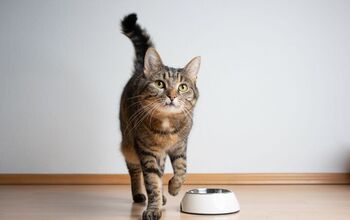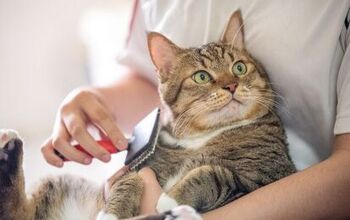Why Do Cats Meow at Night?

You probably think it’s really cute when your cat meows at you to let you know she’s hungry or wants to sit in your lap to get some cuddle time in during the day. At night, though, it’s another story. If you’re trying to get a good night’s sleep but your kitty is up and making a lot of noise, you likely aren’t going to be amused, right?
A cat that makes it a habit to meow loudly throughout the night can definitely be annoying. But even though this behavior might seem unwarranted, there are several reasons why a cat may feel the need to become more vocal once the sun goes down and you’ve gone off to bed.
Rather than getting angry or frustrated with your pet, it’s best to try to figure out what could be causing her nighttime vocalizations. That way, you can get to the actual cause of her restlessness and work on providing the appropriate solution so your furry friend can feel at ease and hopefully start sleeping through at least most of the night.
What are some of the reasons why a cat might spend a lot of time meowing at night? We cover a few of them below, but keep in mind that it’s always a good idea to consult with a veterinarian if your pet is exhibiting strange new behaviors that have you feeling concerned.
Nocturnal Habits
Cats are typically awake at some point during the night, so it can be considered normal behavior if you find your kitty walking around the house, looking for food, playing, or running around to release some energy.
Also, even though you might think that your kitty is a nocturnal animal and her nighttime habits are a result of that, your little feline is actually crepuscular, or mostly active at dawn and dusk. Once you take this into consideration, you might discover that your kitty waking up really early and zooming around the house before the sun comes up is nothing out of the ordinary.
Related: How To Discipline A Cat (Without Losing Your Mind!)
The Night Can Be an Exciting Time for a Cat
Although your kitty spends quite a bit of time awake during the day, he may still feel the need to have a little fun at night, even though this is an inconvenience to your sleep. If your cat is up at night and tends to make noise by running around or meowing loudly, he might be trying to get your attention, he might want food, or he might be ready to play.
You may want to leave some toys out for him to play with (just make sure that they’re safe for independent play), or you might need to change your pet’s feeding schedule so he isn’t as hungry during the night. And you might even consider adopting another kitty so they can keep each other company during the night without bothering you.
Another thing to consider is that younger cats, especially those that are less than 1 year old, are typically highly active at night. And a newly adopted kitten or older cat may cry out at night because he feels a bit frightened, lonely, and insecure in his new surroundings. Taking steps to ensure your new pet feels safe and secure in his new home is key. Rather than locking him out of your bedroom, you might want to let him in so he won’t feel alone in a strange place.
Also, kitties who like to sit at the window and look outside may see and hear things, such as stray cats or wild animals, that make them call out loudly. And loud cats might also be looking for a mate at night, so spaying and neutering your pets may make a difference.
Potential Medical Conditions
Despite natural behaviors and meowing to simply get your attention or to release energy, there are some underlying medical conditions that may cause your cat to become loud and vocal at night.
Related: How To Calm A Hyper Kitten
For example, if you get up to see why your cat is meowing and you find that he’s wandering restlessly throughout the house, he may be uncomfortable or in pain (especially if he’s also vocal during the day). In this case, it’s wise to take your pet to the vet to be examined.
Another cause could be CDS (Cognitive Dysfunction Syndrome), which can make a cat wake up and feel disoriented. Or, if you have a senior kitty, he might be vocalizing if he’s losing his hearing.
When it comes to possible medical problems that might be causing your cat to meow more than usual during the night, don’t hesitate to talk about these changes in behavior with a vet. The solution might be surprisingly simple, and it’s worth doing whatever you can to ensure your kitty feels well.
What You Can Do
In order to get the sleep you need and help your kitty calm down and quiet down, you can try the following tips:
- Interact with your cat by scheduling play sessions during the day, and especially in the evening before bed. A tired cat may be more likely to go to sleep with you and may not have the energy to keep you up at night. Use toys that allow your cat to mimic hunting behavior, and play with your kitty until he appears tired and has had enough.
- Give your cat a meal right before you head to bed, as felines usually like to sleep after a large meal. This might also prevent your cat from asking for food throughout the night or before your alarm goes off. If this doesn’t work, though, you can use a timed feeder during the night. To avoid weight gain, talk to your vet about appropriate meal sizes if you’re adding more meals throughout the night.
- If you find that your cat craves attention and appears lonely or bored at night, getting him a companion kitty may be a good solution, provided that they get along and play with one another. And, whether you have a single cat or more than one, simply closing the door to your bedroom at night could allow them to release energy and play without disturbing you. However, if you close the door and your cat becomes more frustrated, this may not be the right solution, so work with your unique feline to figure out what he would prefer.
- Leave safe cat toys around the house for your kitty to find and play with at night. You may even want to leave some treats around for him to hunt down and munch on until it’s time for breakfast.
- If your cat is older and becomes disoriented at night, leave a night light on here and there, place a warm cat bed in your bedroom so he doesn’t get lonely, and take other steps to ensure he’s comfortable and relaxed.
Ultimately, if you hope to break these nighttime habits, it might not be a good idea to reward your cat’s behavior by giving him attention, playtime, food, etc. in the middle of the night. After ensuring that your kitty isn’t injured or hurt, and figuring out why he’s meowing at night, simply ignoring him might work, especially if fulfilling his requests motivates him to continue bothering you. In other words, to stop the behavior, your cat might need to learn that meowing will get him nowhere while you sleep. At the same time, however, don’t be cruel, as there might be emotional or physical reasons for this behavior. And remember, if you have questions or concerns, contact a veterinarian for some advice.

Lisa Selvaggio is a freelance writer and editor, and our resident cats-pert, with certifications in pet nutrition and pet first aid. She enjoys producing content that helps people understand animals better so they can give their pets a safe and happy home.
More by Lisa Selvaggio























